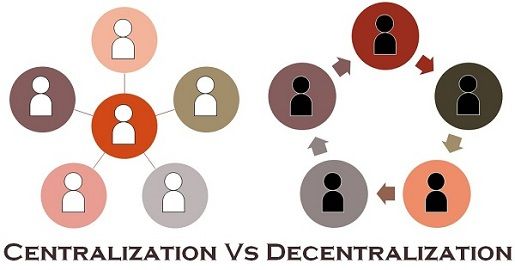 Centralization and Decentralization are the two types of structures, that can be found in the organization, government, management and even in purchasing. Centralization of authority means the power of planning and decision making are exclusively in the hands of top management. It alludes to the concentration of all the powers at the apex level.
Centralization and Decentralization are the two types of structures, that can be found in the organization, government, management and even in purchasing. Centralization of authority means the power of planning and decision making are exclusively in the hands of top management. It alludes to the concentration of all the powers at the apex level.
On the other hand, Decentralization refers to the dissemination of powers by the top management to the middle or low-level management. It is the delegation of authority, at all the levels of management.
To determine whether an organization is centralized or decentralized greatly depends on the location of decision-making authority and the degree of decision-making power at lower levels. There is a never ending debate between these two terms to prove which one is better. In this article, significant differences between Centralization and Decentralization, in an organization is explained.
Content: Centralization Vs Decentralization
Comparison Chart
| Basis for Comparison | Centralization | Decentralization |
|---|---|---|
| Meaning | The retention of powers and authority with respect to planning and decisions, with the top management, is known as Centralization. | The dissemination of authority, responsibility and accountability to the various management levels, is known as Decentralization. |
| Involves | Systematic and consistent reservation of authority. | Systematic dispersal of authority. |
| Communication Flow | Vertical | Open and Free |
| Decision Making | Slow | Comparatively faster |
| Advantage | Proper coordination and Leadership | Sharing of burden and responsibility |
| Power of decision making | Lies with the top management. | Multiple persons have the power of decision making. |
| Implemented when | Inadequate control over the organization | Considerable control over the organization |
| Best suited for | Small sized organization | Large sized organization |
Definition of Centralization
A pivot location or group of managerial personnel for the planning and decision-making or taking activities of the organization is known as Centralization. In this type of organization, all the important rights and powers are in the hands of the top level management.
In earlier times, centralization policy was the most commonly practiced in every organization to retain all the powers in the central location. They have full control over the activities of the middle or low-level management. Apart from that personal leadership and coordination can also be seen as well as work can also be distributed easily among workers.
However, due to the concentration of authority and responsibility, the subordinate employee’s role in the organization is diminished because of all the right vests with the head office. Therefore, the junior staff is only to follow the commands of the top managers and function accordingly; they are not allowed to take an active part in the decision-making purposes. Sometimes hotchpotch is created due to excess workload, which results in hasty decisions. Bureaucracy and Red-tapism are also one of the disadvantages of centralization.
Definition of Decentralization
The assignment of authorities and responsibilities by the top level management to the middle or low-level management is known as Decentralization. It is the perfect opposite of centralization, in which the decision-making powers are delegated to the departmental, divisional, unit or center level managers, organization-wide. Decentralization can also be said as an addition to Delegation of authority.
At present, due to the increase in competition, managers take the decision regarding for the delegation of authority to the subordinates. Due to which the functional level managers get a chance to perform better, as well as freedom of work, is also there. Moreover, they share the responsibility of the high-level managers which results in quick decision making and saving of time. It is a very effective process for the expansion of the business organization, like for mergers and acquisitions.
Although, decentralization lacks leadership and coordination, which leads to inefficient control over the organization. For an effective decentralization process, open and free communication in the organization must be there.
Key Differences Between Centralization and Decentralization
The points given below are noteworthy, so far as the difference between centralization and decentralization is concerned:
- The unification of powers and authorities, in the hands of high-level management, is known as Centralization. Decentralization means dispersal of powers and authorities by the top level to the functional level management.
- Centralization is the systematic and consistent concentration of authority at central points. Unlike, decentralization is the systematic delegation of authority in an organization.
- Centralization is best for a small sized organization, but the large sized organization should practice decentralization.
- Formal communication exists in the centralized organization. Conversely, in decentralization, communication stretches in all directions.
- In centralization due to the concentration of powers in the hands of a single person, the decision takes time. On the contrary, decentralization proves better regarding decision making as the decisions are taken much closer to the actions.
- There are full leadership and coordination in Centralization. Decentralization shares the burden of the top level managers.
- When the organization has inadequate control over the management, then centralization is implemented, whereas when the organization has full control over its management, decentralization is implemented.
Video: Centralization Vs Decentralization
Conclusion
The difference between centralization and decentralization is one of the hot topics these days. Some people think that centralization is better while others are in favor of decentralization. In ancient times, people used to run their organization in a centralized manner, but now the scenario has been changed completely due to rise in the competition where quick decision making is required and therefore many organizations opted for decentralization.
At present, most of the organisation are equipped wth both the features, as absolute centralization or decentralization is not possible. Complete centralization in an organisation not practicable because it represents that each and every single decision of the organisation is taken by the top echelon. On the other hand, full fledge decentralization is an indicator of no control over the activities of subordinates. So, a balance between these two should be maintained.






Debarshi says
Thanks for this post, please post difference between formal and informal organisation.. :
thanks in advance 🙂
Surbhi S says
Thanks for your appreciation, we will surely consider your advice
Mittaphab says
Thank you very much for a very useful information.
ojasvii pratap singh says
thanks!!
Salim M. Msuya says
Thanks a lot for your clear information concerning about decentralization and centralization.
Wilfred says
Nice content bro
Gerald L. Charles says
Am much thank you for your contribution which led me to be sufficient in the present of elite people. Gerald L. Charles. The student In Mount Meru University (DED)
payal sidana says
Thanks a lot for this useful topic…
Tewolde Tsegaye says
Thanks a lot for this topic information
Mohamed says
Thank you for your contribution.
Praveen says
Thans a lot
Chau says
Thank you very much!
sonu bba says
Very important.
Eli Bariki says
The information was so useful to me. May you please speak about communication, leadership, responsibility, accountability, delegation and Administration.
Again, I appreciate your contribution to knowledge.
Surbhi S says
All the topics you’ve mentioned are covered in the website, use search box to get the topic of your interest.
Jephanne Mabong says
Thank you very much for this article. It helps me a lot in understanding my school report.
Keep up the good job 🙂
MALLESHA M says
Thanks for giving lot of information about centralization and decentralization
mbongeni says
thanks a lot it help me to understand better about the forms of the state
Kesolink says
Thanks for your explanation about the difference between the two, I have been finding a good explanation for long but your article just make everything clear to me.
Ren2 says
Very useful for those who are in thier awakening period..
Thanks for sharing this worthy-knowledge words.
Zaka ur rehman says
thanks for giving a lot of information relatd to my topic
Arif Jawed says
Thank You. it helped me in my Exam.
Wada siba, Hadejia says
Good work
katleho mohlabi says
thanks for giving these information about the two i appreciate a lot and it help be understand everything. now am in position to answer any question about them.
Shalini says
Thanks a lot
Jason Montes says
Thank you so much for the very informative content about centralization and decentralization.
Wilfred Marera O says
Nice 👍👍 and legit content 👍
lilian okechi says
wow
Inusah Fuseini says
Nice one
Tewolde Tsegaye says
Thanks a lot!
Tewolde Tsegaye says
Thanks a lot!
For information what is need to establish organizational structure first (mission,vision and values) which came first ?